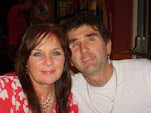


TUESDAY 17 AUGUST
Well, after a couple of days of north-easterlies, the wind returned to westerly today and with it, torrential rain late on.
Something of a surprise was an overnight arrival of post-breeding BLACK-NECKED GREBES - two of which were the first this year in Buckinghamshire. I also ventured into Essex today........
WILSTONE RESERVOIR, TRING (HERTS)
(birding in part with Graham Smith, Stuart Wilson & Steve Rodwell)
Following an early morning call from Dave Bilcock, I quickly ventured out to catch up with his BLACK-NECKED GREBE find - the first at the reservoirs this year. The bird was a juvenile and was showing exceptionally well - diving for food in the shallow channel to the right of the Drayton Bank Hide and present all day. David, Graham Smith and Charlie Jackson all obtained an excellent selection of images of the bird and a portfolio of these are demonstrated above.
In terms of scarcity, other quality birds included the continuing eclipse drake GARGANEY, the two juvenile ICELANDIC BLACK-TAILED GODWITS, two HOBBIES and two family groups of SPOTTED FLYCATCHERS. A Common Greenshank was also present later.
THE SYSTEMATIC LIST
Great Crested Grebe (27 birds present including 5 juveniles)
Continental Cormorant (15)
LITTLE EGRET (adult roosting in Willows)
Grey Heron (3)
Mute Swan (61 including the independent cygnet)
Greylag Geese (33)
Shoveler (12)
Common Teal (large increase - now 23 birds)
GARGANEY (still present between the hide and the overflow)
Pochard (18)
Tufted Duck (44)
Red Kite (1)
Common Kestrel (1)
HOBBY (2 noted)
Coot (711)
Lapwing (238)
Common Sandpiper (1 on the algae bunds)
ICELANDIC BLACK-TAILED GODWIT (the two juveniles showing very well on the muddy margin to the right of the hide)
Black-headed Gull (86)
Common Tern (3 remaining)
COMMON SWIFT (single noted, found by Steve Rodwell)
Great Spotted Woodpecker (2)
*SAND MARTIN (330+)
House Martin (51)
Grey Wagtail (2)
Dunnock (1 in the Overflow Hedge)
Blackcap (3+ in hedgerow at back of Rushy Meadow)
WILLOW WARBLER (3 juveniles with the above)
Common Chiffchaff (5)
SPOTTED FLYCATCHER (Ian Williams discovered this flock last afternoon; today, 10 birds - 2 family parties - were showing very well feeding from the hedgerow at the Drayton side of the Rushy Meadow Field. There were 6 spotty juveniles in total and all were still very young and being fed by the parents. Stuart informed me that both pairs had bred in the village, one in his own garden)
Long-tailed Tit (6)
Chaffinch (2)
Goldfinch (8)
Up against the reedbed was a crashed red and white model plane - registration number D-EATO
STARTOP'S END RESERVOIR (HERTS)
The juvenile Red-crested Pochard was still present, along with 13 Mute Swans, 5 Tufted Duck, the Northern Pochard, 88 Coot, 5 Pied Wagtails (including 4 in a paddock by Startop Farm) and 3 Swallows.
Just as I joined the Tring bypass and headed towards London, I saw a dead juvenile Common Kestrel in the central reservation
Well, after a couple of days of north-easterlies, the wind returned to westerly today and with it, torrential rain late on.
Something of a surprise was an overnight arrival of post-breeding BLACK-NECKED GREBES - two of which were the first this year in Buckinghamshire. I also ventured into Essex today........
WILSTONE RESERVOIR, TRING (HERTS)
(birding in part with Graham Smith, Stuart Wilson & Steve Rodwell)
Following an early morning call from Dave Bilcock, I quickly ventured out to catch up with his BLACK-NECKED GREBE find - the first at the reservoirs this year. The bird was a juvenile and was showing exceptionally well - diving for food in the shallow channel to the right of the Drayton Bank Hide and present all day. David, Graham Smith and Charlie Jackson all obtained an excellent selection of images of the bird and a portfolio of these are demonstrated above.
In terms of scarcity, other quality birds included the continuing eclipse drake GARGANEY, the two juvenile ICELANDIC BLACK-TAILED GODWITS, two HOBBIES and two family groups of SPOTTED FLYCATCHERS. A Common Greenshank was also present later.
THE SYSTEMATIC LIST
Great Crested Grebe (27 birds present including 5 juveniles)
Continental Cormorant (15)
LITTLE EGRET (adult roosting in Willows)
Grey Heron (3)
Mute Swan (61 including the independent cygnet)
Greylag Geese (33)
Shoveler (12)
Common Teal (large increase - now 23 birds)
GARGANEY (still present between the hide and the overflow)
Pochard (18)
Tufted Duck (44)
Red Kite (1)
Common Kestrel (1)
HOBBY (2 noted)
Coot (711)
Lapwing (238)
Common Sandpiper (1 on the algae bunds)
ICELANDIC BLACK-TAILED GODWIT (the two juveniles showing very well on the muddy margin to the right of the hide)
Black-headed Gull (86)
Common Tern (3 remaining)
COMMON SWIFT (single noted, found by Steve Rodwell)
Great Spotted Woodpecker (2)
*SAND MARTIN (330+)
House Martin (51)
Grey Wagtail (2)
Dunnock (1 in the Overflow Hedge)
Blackcap (3+ in hedgerow at back of Rushy Meadow)
WILLOW WARBLER (3 juveniles with the above)
Common Chiffchaff (5)
SPOTTED FLYCATCHER (Ian Williams discovered this flock last afternoon; today, 10 birds - 2 family parties - were showing very well feeding from the hedgerow at the Drayton side of the Rushy Meadow Field. There were 6 spotty juveniles in total and all were still very young and being fed by the parents. Stuart informed me that both pairs had bred in the village, one in his own garden)
Long-tailed Tit (6)
Chaffinch (2)
Goldfinch (8)
Up against the reedbed was a crashed red and white model plane - registration number D-EATO
STARTOP'S END RESERVOIR (HERTS)
The juvenile Red-crested Pochard was still present, along with 13 Mute Swans, 5 Tufted Duck, the Northern Pochard, 88 Coot, 5 Pied Wagtails (including 4 in a paddock by Startop Farm) and 3 Swallows.
Just as I joined the Tring bypass and headed towards London, I saw a dead juvenile Common Kestrel in the central reservation

No comments:
Post a Comment